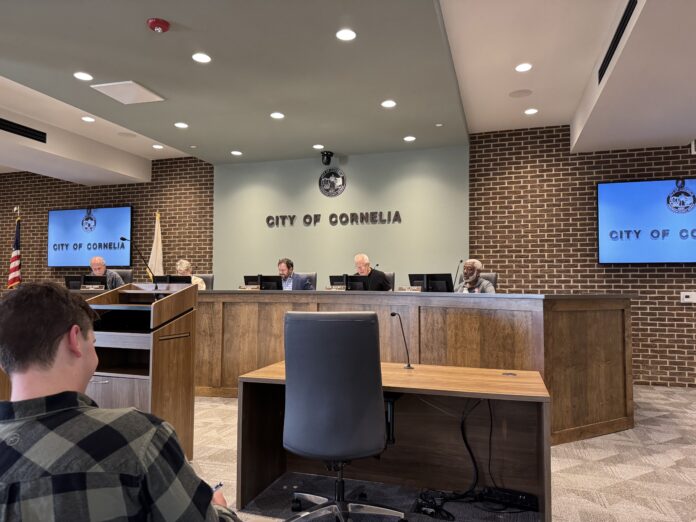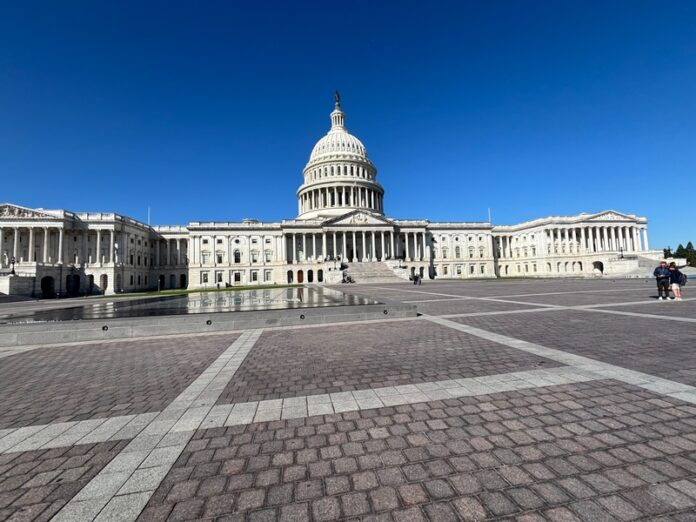WASHINGTON (States Newsroom) — The nonpartisan Congressional Budget Office released detailed analysis Wednesday showing Republicans’ “big, beautiful bill” would increase federal deficits by $2.4 trillion during the next decade.
CBO projects that if enacted as written, the legislation would result in 10.9 million people losing access to health insurance by 2034, a number that includes “1.4 million people without verified citizenship, nationality, or satisfactory immigration status who would no longer be covered in state-only funded programs in 2034.”
The score is the most up-to-date analysis by Congress’ official scorekeeper on how the sweeping tax and spending cuts package the House approved last month will impact the federal budget in the years ahead.
Republicans have been highly critical of the CBO’s assessment of the legislation’s real-world impacts, arguing that keeping tax rates as they are now, instead of letting them rise at the end of the year when the 2017 GOP tax law expires, will boost economic growth.
House Majority Leader Steve Scalise, R-La., lambasted the CBO during a press conference shortly after the report came out, arguing its economic growth projections haven’t been completely accurate.
“This bill will actually reduce the deficit, if you recognize the historical economic growth that has always been there,” Scalise said. “To say you’re going to get 1.8% growth. At a minimum, we think you can get 2.5 to 4% growth. Scott Bessent, the Treasury secretary, says over 4% economic growth. So I get that we’ve got to play by the rules of the referee, but the referee has been wrong.”
During the last decade, U.S. growth only surpassed 3% during one year, according to data from the U.S. Bureau of Economic Analysis.
Gross domestic product growth measured 2.5% in 2014, 2.9% in 2015, 1.8% in 2016, 2.5% in 2017, 3% in 2018, 2.6% in 2019, -2.2% in 2020 during the beginning of the coronavirus pandemic, 6.1% in 2021, 2.5% in 2022, 2.9% in 2023 and 2.8% in 2024.
White House budget director Russ Vought posted on social media that the CBO score “confirms what we knew about the bill at House passage.”
“The bill REDUCES deficits by $1.4 trillion over ten years when you adjust for CBO’s one big gimmick–not using a realistic current policy baseline,” Vought wrote. “It includes $1.7 trillion in mandatory savings, the most in history. If you care about deficits and debt, this bill dramatically improves the fiscal picture.”
Disagreement over the ‘big beautiful bill’
GOP lawmakers have also sought to brush aside criticism from some of their own members, including Kentucky Sen. Rand Paul and Wisconsin Sen. Ron Johnson, who both argue the legislation must cut spending more to reduce the federal deficit in the long run.
Billionaire and former Trump administration staffer Elon Musk has also become increasingly vocal about his opposition to the package, writing on social media this week that the “massive, outrageous, pork-filled Congressional spending bill is a disgusting abomination.”
The House voted mostly along party lines in May to send the sweeping spending and tax cuts package to the Senate, which is expected to debate and amend the legislation in the weeks ahead.
CBO’s analysis will likely inform some of that conversation, and help senators better understand how the policy changes proposed by their House colleagues would affect state government budgets and the communities they represent.
The CBO previously shared analysis of each of the 11 bills that make up the package, but those didn’t reflect several changes GOP House leaders made just hours before the floor vote in that chamber.
Updated numbers
The updated projections show Republicans’ plan to extend the 2017 tax law and make other tweaks to tax policy would increase the deficit by $3.754 trillion during the next decade. That increase to the deficit caused by the tax changes, which CBO has also found would decrease resources for low-income families over the next decade while increasing resources for top earners, would be partly offset by spending reductions on certain programs.
The Armed Services Committee’s bill would increase deficits by $144 billion, more than the $100 billion ceiling Republicans envisioned in the budget outline that was supposed to set guardrails on the package. Homeland Security’s provisions would increase deficits by $79 billion. And the Judiciary Committee’s language would increase deficits by $9 billion during the 10-year budget window.
The section of the package drafted by the Energy and Commerce Committee, which would make substantial changes to Medicaid and several other programs within the panel’s jurisdiction, would decrease spending by $1.086 trillion during the 10-year budget window.
The panel’s bill has four subcategories: energy, environment, communications and health. The health provisions, which include substantial changes to Medicaid, would reduce federal spending by $902 billion between 2025 and 2034.
Language barring Medicaid from covering gender transition procedures for anyone in the state-federal health program would reduce federal spending by $2.6 billion during the next decade.
Requiring some people on Medicaid to work, participate in community service or attend educational programs for at least 80 hours a month would reduce federal spending by $344 billion during the next 10 years.
Blocking any Medicaid funding from going to Planned Parenthood would cut federal costs by $261 million during the 10-year budget window. Federal law already bars health care programs like Medicaid from covering abortions unless the pregnancy is the result of rape or incest, or it endangers the life of the woman.
Separate analysis from CBO, released later Wednesday, projects that 7.8 million people would lose access to Medicaid because of the policy changes laid out in the House GOP bill. Another 2.3 million would lose access to health insurance due to changes to tax policy and 1.3 million people would no longer be able to purchase health insurance through the Affordable Care Act marketplace.
CBO estimates that about 500,000 people would be impacted by interactions among the various health care policy changes. That number, subtracted from the numbers of those who would lose access, leads to a total of 10.9 million people losing access to health insurance by 2034.
Democratic criticism
Energy and Commerce Committee ranking member Frank Pallone Jr., a New Jersey Democrat, wrote in a statement that it’s “shocking House Republicans rushed to vote on this bill without an accounting from CBO on the millions of people who will lose their health care or the trillions of dollars it would add to the national (deficit).
“The truth is Republican leaders raced to pass this bill under cover of night because they didn’t want the American people or even their own members to know about its catastrophic consequences.”
The Agriculture Committee’s provisions, including pushing off some of the cost of the Supplemental Nutrition Assistance Program to states, would reduce federal spending by $238 billion during the next decade.
The Education and Workforce Committee’s language would decrease federal spending by $349 billion. The Financial Services section of the package would reduce federal spending by $5 billion. Natural Resources would lower spending by $18 billion. And Transportation and Infrastructure would reduce spending by nearly $37 billion.
The Oversight and Government Reform bill would decrease spending by $12 billion, significantly less than the minimum of $50 billion the panel was supposed to cut under the reconciliation instructions included in the budget resolution.
Ariana Figueroa contributed to this report.
















